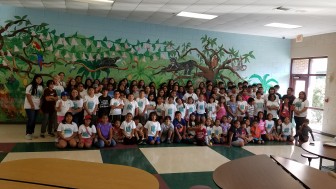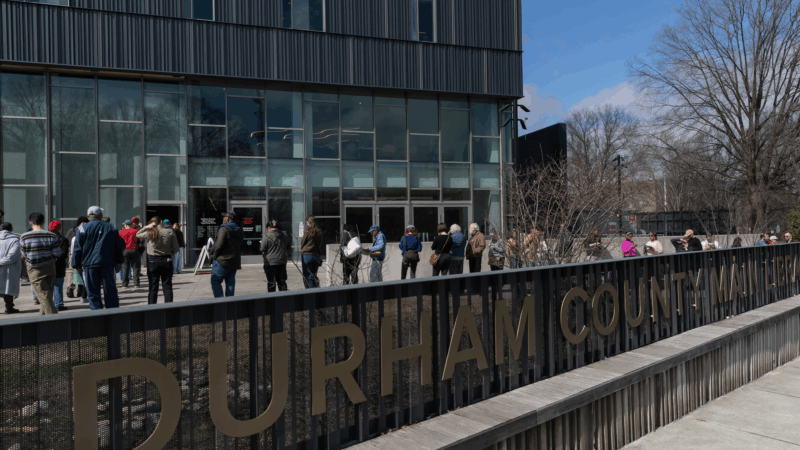Uncertain Immigration Policy Takes a Toll on Area Youth
Hundreds of protests took place over the weekend across the country –including in Birmingham– to oppose President Trump’s “zero tolerance” immigration policies.Those policies separated more than 2,0000 children from their parents at the U.S.-Mexico border. There’ve been a series of developments since then, and a lot of uncertainty around the fate of undocumented residents. And that’s rubbing off on children in Alabama. Mary Scott Hodgin has that story.
Renewed Concerns
This summer, more than 100 kids participated in St. Clair County’s English Learners camp, which offers a week of classic summer camp activities for students learning English. “Well on Monday we went fishing and then yesterday what we did was mostly arts and crafts and then today we’re going to go bowling,” says 15-year-old Kelly Mejia, whose parents are from Mexico and El Salvador. Like Mejia, most kids at the camp speak Spanish and their parents are immigrants. A record number of students attended this year, which teachers say reflects a strong level of trust with the local immigrant community. However, for older students who say they have been paying attention to recent developments regarding the Trump administration’s zero-tolerance policy, which separated families at the border, they are more anxious.
A Fear and a Burden
17-year old Maria Rivera’s parents immigrated to the US from Mexico. She says she is proud to be Mexican-American, but lately, she has been more guarded about her identity. “I don’t tell a lot of … people that my parents are immigrants, because I have that fear – that fear that my parents could be ripped away from me at any time,” she says.
Gabriela Wages is the bilingual aide and parent liaison for St. Clair County’s English Learners department. Wages says there is always concern when immigration policy changes. Most of her students’ parents do not speak English, and some are undocumented. She says this places a burden on the kids, explaining, “Because they are bilingual. They have the social English that parents need to communicate. And then the pressure of knowing that they are the ones that need to keep parents informed, we cannot rely on that. They are students. They don’t know anything about the law.” Wages says teachers have to stay informed to help bridge this gap. She and fellow educators encourage students and their parents to come to them with questions and stay involved at school.
Building Trust
Building this relationship with the local immigrant community has not always been easy, says Gregg Cobb. He is the federal programs manager for St. Clair County. When he started the English Learners camp three years ago, Cobb says parents were reluctant to enroll their kids and especially did not want them to go on field trips off-campus. But that has changed over time. “This year specifically, to have almost every child that was in the program all week attend a field trip that’s in Birmingham, is totally… it’s really awesome to me because it tells me that we have gained the trust of the Hispanic community,” says Cobb.
Students are happy about it. They say their favorite part of camp is being around other kids like them. For Maria Rivera, it is a place where she is not afraid to talk about the fact that her parents are immigrants. “Here you’re filled with kids who, who know the struggle, who’ve been with you, who can relate,” she says. For now, part of that struggle is living with the uncertainty surrounding immigration policy.
The candy heir vs. chocolate skimpflation
The grandson of the Reese's Peanut Butter Cups creator has launched a campaign against The Hershey Company, which owns the Reese's brand. He wants them to stop skimping on ingredients.
Scientists make a pocket-sized AI brain with help from monkey neurons
A new study suggests AI systems could be a lot more efficient. Researchers were able to shrink an AI vision model to 1/1000th of its original size.
U.S. evacuates diplomats, shuts down some embassies as war enters fourth day
The United States evacuated diplomats across the Middle East and shut down some embassies as war with Iran intensified Tuesday while President Trump signaled the conflict could turn into extended war.
North Carolina and Texas have primary elections Tuesday. Here’s what you need to know
The midterm elections are officially underway and contests in Texas and North Carolina will be the first major opportunity for parties to hear from voters about what's important to them in 2026.
Kristi Noem set to face senators over DHS shutdown, immigration enforcement
The focus of the hearing is likely to be on how Kristi Noem is pursuing President Trump's mass deportation efforts in his second term, after two U.S. citizens were killed by immigration officers.
College students, professors are making their own AI rules. They don’t always agree
More than three years after ChatGPT debuted, AI has become a part of everyday life — and professors and students are still figuring out how or if they should use it.








